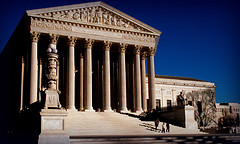
The Supreme Court hears 8 cases this week, and 3 next (the imbalance is owed to the Inauguration next week). Here’s a quick rundown, with links to our analyses of each:
Monday, 12 January:
- Coeur Alaska v. Southeast Alaska Conservation Council (w/ Alaska v. Southeast Alaska Conservation Council)(Clean Water Act, mining discharge, effluent limitations)
- Ministry of Defense of Iran v. Elahi (Iran-US Claims Tribunal, Terrorism Risk Insurance Act)
- Harbison v. Bell (Terrorist Death Penalty Enhancement Act, counsel, capital punishment)
Tuesday, 13 January:
- Montejo v. Louisiana (insanity, habeas, ineffective assistance of counsel)
- Vermont v. Brillon (indigent, assigned counsel, Wingo test)
- Knowles v. Mirzayance (Sixth Amendment, Miranda)
Wednesday, 14 January:
- Puckett v. United States (sentencing, plain error doctrine)
- Boyle v. United States (RICO, due process, 5th Amendment)
Wednesday, 21 January:
- Corley v. United States (Miranda, FRCP 5a, McNabb-Mallory)
- Kansas v. Ventris (6th Amendment, right to counsel, perjury)
- Nken v. Mukasey


 Normally we’re asocial here at the LII — our idea of a social-networking site is
Normally we’re asocial here at the LII — our idea of a social-networking site is 


 Latin for “to stand by things decided.” Stare decisis is essentially the doctrine of
Latin for “to stand by things decided.” Stare decisis is essentially the doctrine of  The findings of a new
The findings of a new  The law was made for one thing alone, for the exploitation of those who don’t understand it, or are prevented by naked misery from obeying it.
The law was made for one thing alone, for the exploitation of those who don’t understand it, or are prevented by naked misery from obeying it. A “per curiam” decision is issued in the name of the Court rather than specific justices. Most decisions on the merits by the Supreme Court (and other appellate courts in the US) take the form of one or more opinions signed by individual justices (and joined in by others). Even when such signed opinions are unanimous, they are not termed “per curiam.” “Per curiam” decisions are given that label by the Court itself and tend to be short. Usually, though not always, they deal with issues the Court views as relatively non-controversial.
A “per curiam” decision is issued in the name of the Court rather than specific justices. Most decisions on the merits by the Supreme Court (and other appellate courts in the US) take the form of one or more opinions signed by individual justices (and joined in by others). Even when such signed opinions are unanimous, they are not termed “per curiam.” “Per curiam” decisions are given that label by the Court itself and tend to be short. Usually, though not always, they deal with issues the Court views as relatively non-controversial.